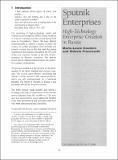| dc.contributor.author | Couderc, Marie?Laure | en |
| dc.contributor.author | Franceschi, Vittorio | en |
| dc.date.accessioned | 2016-02-24T15:05:40Z | |
| dc.date.available | 2016-02-24T15:05:40Z | |
| dc.date.issued | 01/07/1998 | en |
| dc.identifier.citation | Couderc, M.,?L. and Franceschi, V. (1998) Sputnik Enterprises: . IDS Bulletin 29(3): 33-42 | en |
| dc.identifier.issn | 1759-5436 | en |
| dc.identifier.uri | https://opendocs.ids.ac.uk/opendocs/handle/20.500.12413/9161 | |
| dc.description.abstract | Summaries Russian scientific and technical capacities under socialism were mainly concentrated in academic research institutes. Their human and incorporated assets are now threatened by two factors: lack of resources, affected by a weakened state, and a structural disconnection from productive capacities, inherited from the socialist system in which institutes supplied their results to administrative bodies and had no direct relations with industry. Academic institutes are therefore undergoing decline or profound restructuring. A new phenomenon appears in this context: the appearance of high?technology SMEs orbiting around academic institutes. The link between these SMEs and institutes characterises a creation mode specific to post?socialism and provides a promising alternative to the institutes' decline. This analysis is based on surveys conducted by the authors in institutes and emerging SMEs in a Siberian science city. | en |
| dc.format.extent | 10 | en |
| dc.publisher | Institute of Development Studies | en |
| dc.relation.ispartofseries | IDS Bulletin Vol. 29 Nos. 3 | en |
| dc.rights.uri | http://www.ids.ac.uk/files/dmfile/IDSOpenDocsStandardTermsOfUse.pdf | en |
| dc.title | Sputnik Enterprises: | en |
| dc.type | Article | en |
| dc.rights.holder | © 1998 Institue of Development Studies | en |
| dc.identifier.doi | 10.1111/j.1759-5436.1998.mp29003005.x | en |

